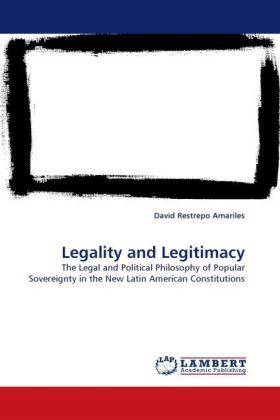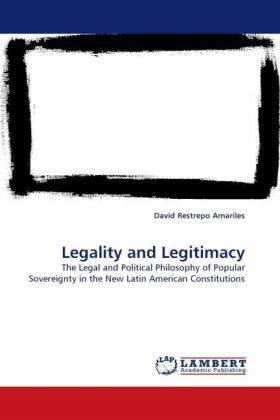
- Afhalen na 1 uur in een winkel met voorraad
- Gratis thuislevering in België vanaf € 30
- Ruim aanbod met 7 miljoen producten
- Afhalen na 1 uur in een winkel met voorraad
- Gratis thuislevering in België vanaf € 30
- Ruim aanbod met 7 miljoen producten
Zoeken
Legality and Legitimacy
The Legal and Political Philosophy of Popular Sovereignty in the New Latin American Constitutions
David Restrepo Amariles
Paperback | Engels
€ 58,45
+ 116 punten
Omschrijving
A vigorous constitutional movement has characterized the last two decades of Latin American politics. Claiming to recover popular sovereignty through the establishment of new constitutions the reformers, led by the Venezuelan president Hugo Chávez, aim at moving beyond the heritage of liberal modernity and establishing new states capable of abolishing historical oppressions while at the same time accomplishing emancipation. The author delves into the philosophical underpinnings of this idea, utilizing the concepts of legality and legitimacy as foundations upon which to build his claims. This thriving work proposes an interdisciplinary approach bringing together the history of philosophical ideas and a contextualized legal, political and sociological analysis of contemporary politics in Latin America. The author concludes that the underlying philosophy and institutional setting of the new Latin American constitutions, and particularly those issued of the Bolivarian Revolution, do not provide an alternative to the modern liberal state, but rather, they establish a new ideological framework which aims to recover lost faith in modern ideals.
Specificaties
Betrokkenen
- Auteur(s):
- Uitgeverij:
Inhoud
- Aantal bladzijden:
- 140
- Taal:
- Engels
Eigenschappen
- Productcode (EAN):
- 9783838344812
- Verschijningsdatum:
- 26/06/2010
- Uitvoering:
- Paperback
- Formaat:
- Trade paperback (VS)
- Afmetingen:
- 152 mm x 229 mm
- Gewicht:
- 213 g

Alleen bij Standaard Boekhandel
+ 116 punten op je klantenkaart van Standaard Boekhandel
Beoordelingen
We publiceren alleen reviews die voldoen aan de voorwaarden voor reviews. Bekijk onze voorwaarden voor reviews.











